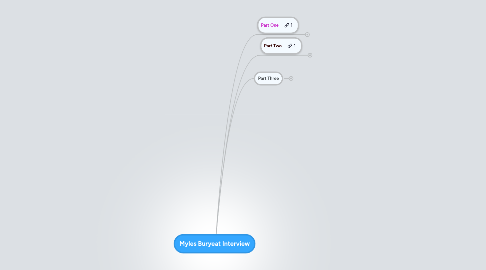
1. Part One
1.1. Biography Retold
1.1.1. Not especially useful for DP Test
1.1.2. When Plato was 31, Socrates died, Plato lived until 81
1.1.2.1. This was the launching pad for Plato's career
1.2. Pattern of Dialogues is standard
1.2.1. Meeting someone who is self-assured they are correct, they are hit with awkward questions, and then doubt is raised and the interloper sees that the problem is more complicated than initially understood.
1.2.1.1. Guilt, Friendship, Justice, All terms that were introduced, but never truly understood.
1.3. Moral Questions was Plato's primary concern
1.3.1. This differed from earlier metaphysical philosphers
2. Part Two
2.1. Plato appears to be neutral during the dialogues
2.1.1. Was he being disingenuous?
2.2. Harm is the loss of your virtue through being unjust
2.2.1. Unpleasant things that happen to you really don't have anything to do with happiness. You could be very ill, but because you acted with justice, you are happy.
2.3. Injustice will harm the doer and Justice will do good for the doer.
2.4. The Importance of Knowledge
2.4.1. Wisdom and courage is important because you can act upon what the right thing to do.
2.4.1.1. Thinking or yourself is most important skill
2.4.2. Wrongdoing is done involuntarily and happens because of ignorance
2.4.2.1. Pulling a chair out from a fellow 3rd grader.
2.5. A Priora Knowledge
2.5.1. Born with this and able to uncover it through the course of self-examination.
2.5.1.1. Chomsky and grammar for example
2.5.1.2. This is where ethics comes from
2.6. Endurance is overrated
2.6.1. Just because you've done something for 20 years doesn't mean you are any better at doing it. You may have been doing something wrong for 20 years.
3. Part Three
3.1. We all have within out minds the correct answers of what is courage, justice, friendship, etc.
3.2. Theory of Forms
3.2.1. Greatest contribution of Plato
3.2.2. Beauty, Justice, and other abstractions have meaning independent of human perception
3.2.2.1. Don't think of these as a separate place. Not the here and now.
3.3. The stylistic form of The Plato
3.3.1. Never-ending Questions and nothing answered completely and for certain.
3.4. Tri-tripartite Soul
3.4.1. Taking human nature and expanding it to a society. All of these three components are present in the human and society.
3.4.1.1. Heart
3.4.1.2. Stomach
3.4.1.3. Head
3.4.2. Applying it in proper proportion is the work of the philosopher kings
